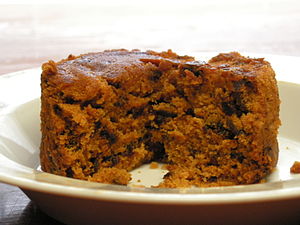 | |
| Type | Pudding |
|---|---|
| Place of origin | United Kingdom |
| Main ingredients | Suet, dried fruit, flour, sugar, milk, baking powder |
Spotted dick is a traditional British steamed pudding, historically made with suet and dried fruit (usually currants or raisins) and often served with custard.
Non-traditional variants include recipes that replace suet with other fats (such as butter), or that include eggs to make something similar to a sponge pudding or cake.
Etymology
Spotted is a reference to the dried fruit in the pudding (which resembles spots). The word dick refers to pudding. In late 19th century Huddersfield, for instance, a glossary of local terms stated: "Dick, plain pudding. If with treacle sauce, treacle dick." This sense of dick may be related to the word dough. In the variant name spotted dog, dog is a variant form of dough.
History

The dish is first attested in Alexis Soyer's The Modern Housewife or, Ménagère, published in 1849, in which he described a recipe for "Plum Bolster, or Spotted Dick – Roll out two pounds of paste have some Smyrna raisins well washed".
The name "spotted dog" first appeared in 1855, in C.M. Smith's "Working-men's Way in the World" where it was described as a "very marly species of plum-pudding". This name, along with "railway cake", is most common in Ireland where it is made more similar to a soda bread loaf with the addition of currants.
The Pall Mall Gazette reported in 1892 that "the Kilburn Sisters daily satisfied hundreds of dockers with soup and Spotted Dick".
The name has long been a source of amusement and double entendres; reportedly restaurant staff in the Houses of Parliament decided to rename it "Spotted Richard" so it was "less likely to cause a stir".
See also
- Clootie dumpling, a similar Scottish Traditional Pudding
- Figgy duff, a bag pudding from Newfoundland
- Poutchine au sac, Métis bag pudding from Western Canada
- List of fruit dishes
- List of steamed foods
References
- "Spotted Dick". British Food: A History. 2014-01-23. Retrieved 2022-03-10.
- ^ "What's the origin of "spotted dick"?". The Straight Dope. 2002-08-27. Retrieved 2022-03-10.
- ^ Ayto, John (2012). The Diner's Dictionary: Word Origins of Food and Drink. Oxford University Press. p. 349. ISBN 978-0199640249.
- Newman, Kevin (15 July 2021). Pond Puddings and Sussex Smokies: Sussex's Food and Drink. Amberley Publishing Limited. ISBN 978-1-4456-9707-9.
- Ashley, Leonard R. N. (1968). "Scoff Lore: An Introduction to British Words for Food and Drink". Names. 16 (3): 238–272. doi:10.1179/nam.1968.16.3.238.
- Eric Partridge (2003). The Routledge Dictionary of Historical Slang. Routledge. pp. 5085–. ISBN 978-1-135-79542-9.
- John Ayto (1994). A Gourmet's Guide: Food and Drink from A to Z. Oxford University Press. ISBN 978-0-19-280025-1.
- "Spotted Dick 'renamed Spotted Richard' to spare blushes in parliament". Sky News. Retrieved 2020-08-02.